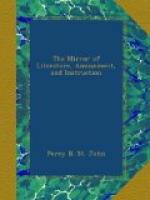Thus, not only did those places retain his name which afforded him security or amusement, but even the well at which he quenched his thirst. There is also Robin Hood’s Bay, on the coast of Yorkshire. It is mentioned by Leland as “a fischer tounlet of 20 bootes caulled Robyn Huddes Bay, a dok or bosom of a mile yn length:” in this bay he often went fishing in the summer season, and not far from this he had butts or marks set up, where he used to exercise his men in shooting with the long bow.
After Robin’s death, his company dispersed, and are supposed to have been distinguished from the name of their gallant leader, by the title of Roberdsmen. It may not be uninteresting to subjoin a short account of the last days of Robin’s friend and favourite, Little John. The honour of his death and burial is contended by rival nations, first by England. At the village of Hathersage, about six miles from Castleton, in Derbyshire, is Little John’s grave. Tradition states, some curious person caused it to be opened, when there were found several bones of uncommon size, which he preserved; but meeting afterwards with many unlucky accidents, he carefully replaced them, partly at the intercession of the sexton who had taken them up for him, and who had in like manner been visited with misfortunes, but upon restoring the bones all these troubles ceased. Secondly, by Scotland. In Murray-land, according to the historian, Hector Boece, is “the Kirke of Pette, quhare the banis of Lytill Johne remainis in grete admiratioun of pepill. He hes bene fourtene feet of hycht with square membris effering thairto VI zeris,” continues he, “afore the cumyng of this werk to lycht we saw his hanche-bane, als mekill as the hail bane of ane man, lor we schot our arme in the mouth thairof. Be quhilk apperis how strang and square pepill grew in our regioun afore they were effeminat with lust and intemperance of mouth.” Thirdly, by Ireland. “There stood,” as Stanihurst relates, “in Ostmantowne greene an hillocke, named Little John his shot. The occasion,” he says, proceeded of this—“In the yeere one thousand one hundred foure score and nine, there ranged three robbers and outlaws in England, among which Robert Hood and Little John weere cheefeteins, of all theeves doubtlesse the most courteous. Robert Hood being betrayed at a nunrie in Scotland,




